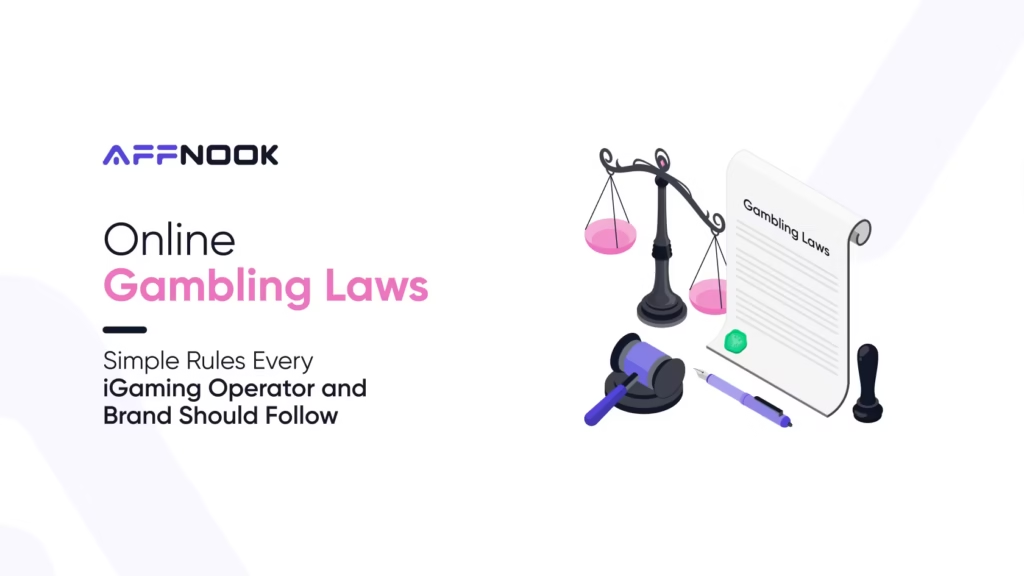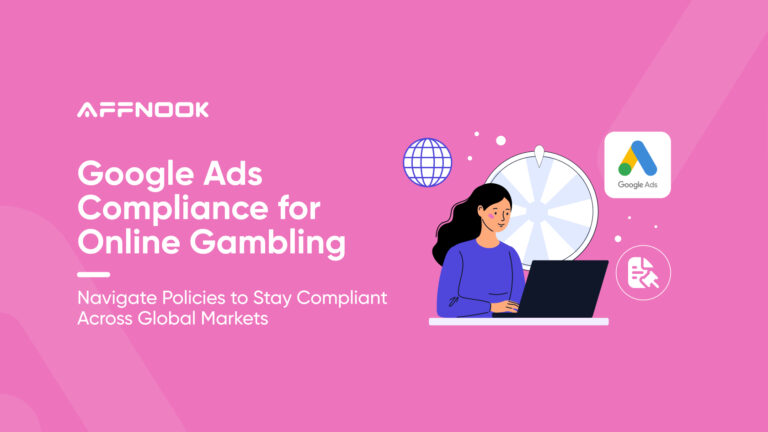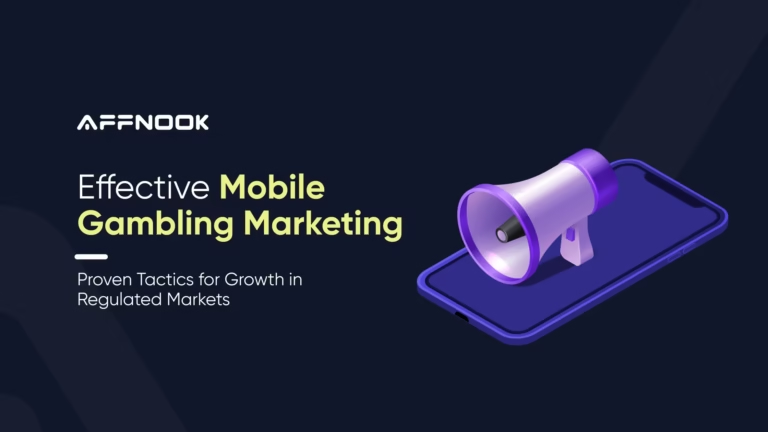Running an online gambling site might seem exciting, but it is also a big responsibility for brands and operators. If you don’t follow the online gambling laws, you can face serious problems like penalties, losing your license, or even legal consequences.
So if you’re failing to follow laws, it can lead your profitable business into liabilities.
If we talk about the growth factor, the global gambling market is expected to generate $449.67 billion in revenue in 2025 and is expected to grow to $510.16 billion by 2029, according to Statista. And this revenue is going to attract even more attention from government bodies.
In this blog, you will learn about the importance of gambling laws, what happens if you don’t follow them, and tips to stay safe and legal in the iGaming industry.
Why Are These Laws Important?
Online gambling laws are not created to make things harder, but they are made to protect players from unfair activities and to make the gambling market clean and transparent. Without proper rules and regulations, fraud, addiction, and exploitation can increase significantly.
Here are the key reasons why these laws matter:
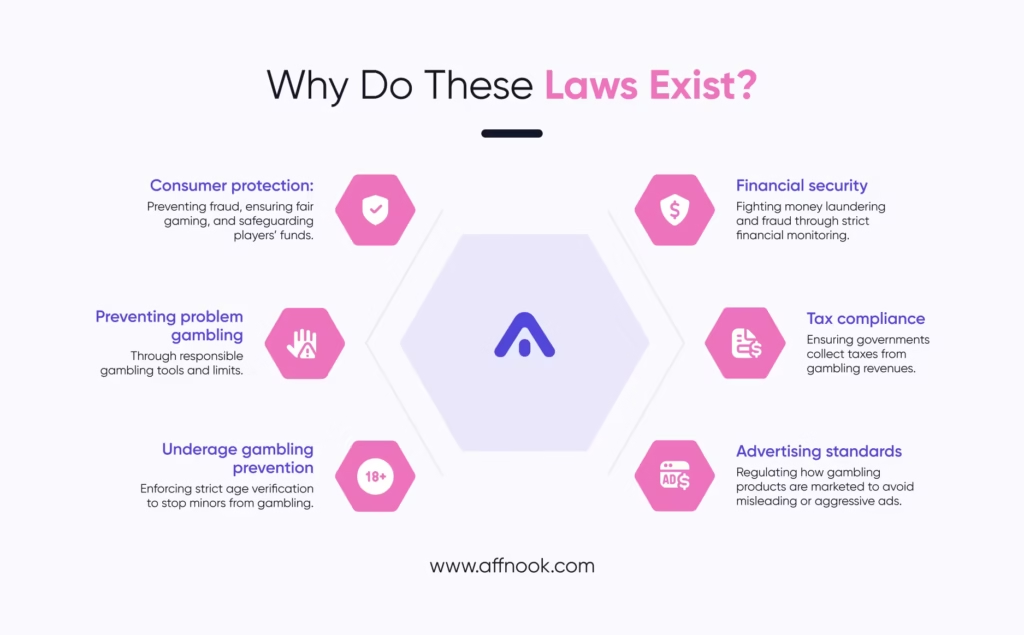
What Happens If You Don’t Follow the Laws?
Not following gambling laws can create a serious problem for iGaming businesses. Here is the breakdown of what can happen if you ignore online gambling laws:
1. Heavy Fines and Penalties
Government and regulated bodies can impose heavy fines on brands and operators who do not follow the gambling laws. These penalties can reach up to millions of dollars, depending on the types of violations and the region.
For example,
If a gambling company operates without a license or tries to target a country where gambling is illegal, it may be charged with violating that country’s laws.
Why it matters: Fines don’t hurt the profit margin. They also alert other partners, like advertisers and payment providers, that your business is risky.
2. Shutdowns and Website Blocking
Regulators in many countries can give an order to shut down or block your website, especially if you are offering gambling services illegally in their regions. This means the local internet service providers do not allow people to visit your website at all.
3. Legal Action and Charges
In some cases, if you’re not following online gambling laws, you can face criminal prosecution, such as:
- Court cases
- Lawsuits from users or regulators
- Criminal prosecution (even jail time in countries like India or the UAE)
These penalties vary by country, but they’re always damaging to your business and brand.
4. Loss of Payment Services
Payment processors are an important part of any iGaming platforms. But if you don’t follow gambling laws, companies like PayPal, Stripe, Skrill, or even traditional banks might cut ties with you.
Without secure payment services:
- The user cannot smoothly deposit or withdraw.
- Trust in your offerings drops.
- Your operations may come to a halt.
5. Damage Reputation and Partnerships
In the gambling industry, trust is the main concern; if you do not follow proper laws, it may affect your business, or you might lose a deal with your business pillars, like
- Affiliate marketers
- Ad networks
- Game developers
6. Violating Online Gambling Advertising Laws
Operators that do not follow iGaming advertising laws may be banned from major platforms like Google, Facebook, or ad networks. These platforms have strict rules and regulations for gambling display ads, such as:
- Only targeting countries where gambling is legal
- Showing clear age restrictions (like 18+ only)
- Avoiding misleading offers or fake bonuses
If brands and operators break these rules even by mistake, they can lose access to advertising tools that help bring in players.
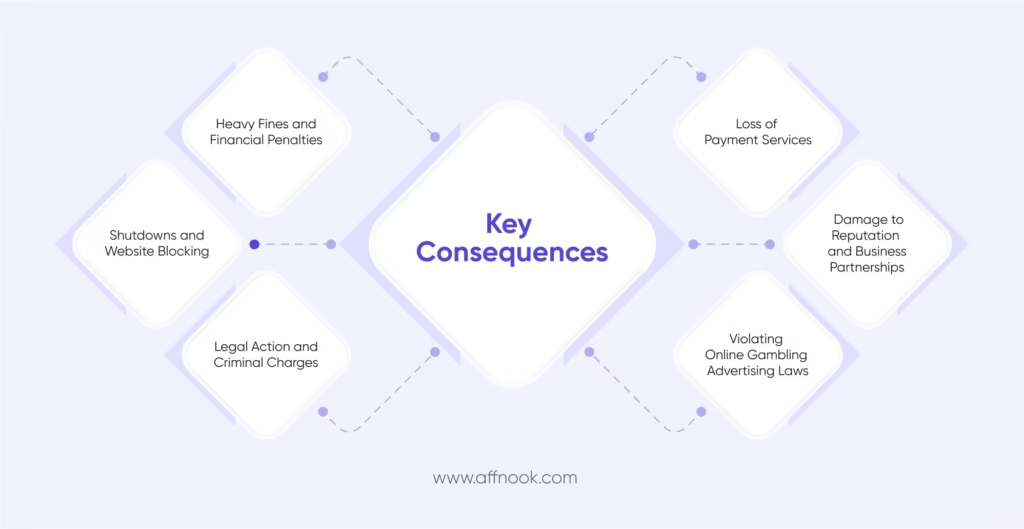
How to Stay Compliant in Different Countries
If you are operating your gambling business in multiple regions. You can not follow just one set of rules everywhere.
Each country has its own online gambling laws, licensing system, and advertising rules. To avoid legal trouble and keep your business running smoothly, here’s what you need to do:
1. Get the Right Licenses
Not every gambling license is accepted worldwide. A license from one regulatory authority (like Curacao) might not be valid in another (like the UK or Germany). So, if you’re targeting players in different regions, you need to:
- Apply for local licenses where required.
- Understand the license terms (e.g., game types allowed, age limits, etc.).
- Avoid offering services in banned regions.
2. Adjust Your Operations
Each country has different rules for things like:
- How do you verify a player’s age and identity?
- How do you handle problem gambling and self-exclusion?
- The types of games or bets you can offer.
To stay compliant, you may need to customize your platform for each market. That might mean different onboarding processes, game types, or customer support features based on where the user is located.
3. Watch Your Marketing
Marketing rules are strict and vary from country to country. Some common restrictions include:
- Banning gambling ads entirely (like in India or parts of the UAE)
- Only targeting people over 18 or 21
- Avoiding misleading promotions (e.g., “risk-free” bets when there’s a cost)
If you break these rules, platforms like Google, Meta, or regional regulators can block your ads or penalize your business.
4. Keep Up With Legal Changes
Online gambling laws are constantly evolving. What’s legal today might not be tomorrow.
To avoid being caught off guard:
- Follow local news and regulatory updates
- Work with legal consultants in key markets
- Join industry groups or forums to stay informed
Regular audits and compliance checks help you stay ahead of new rules before they become a problem.
How Governments Enforce Online Gambling Laws
Website Blocking and ISP Restrictions – Regulators often collaborate with ISPs to block access to illegal gambling sites. China’s Great Firewall and the UAE’s internet controls are extreme examples. Many European countries also maintain blacklists of banned domains.
Payment Monitoring and Transaction Bans – Financial institutions play an important role in monitoring gambling-related payments. Operators who do not hold a licence find it difficult to receive payments because banks block their accounts or transactions.
The US Treasury’s Financial Crimes Enforcement Network (FinCEN) actively investigates suspicious gambling-related financial flows.
Investigations and Prosecutions – Regulatory bodies conduct audits, surveillance, and undercover operations to identify illegal operators. If evidence of a violation is found, prosecutions follow.
For example, the UK Gambling Commission has publicly shared multiple enforcement actions taken against operators for failing their responsible gambling obligations.
Enforcement of Online Gambling Advertising Laws – Advertising regulators require gambling ads to follow strict rules, including:
- Only advertising licensed operators.
- Geo-targeting ads to allowed jurisdictions.
- Including responsible gambling disclaimers.
- Avoid misleading or targeting minors.
Tips to Stay Safe and Legal Under Online Gambling Laws
If you’re an operator or brand working in the iGaming space, compliance with gambling laws isn’t just a box to check; it’s essential to your long-term success. Here are key ways to stay on the right side of the law while protecting your business and your players:
Verify License Status
As an operator, always ensure your gambling license is valid and visible on your website. Regulators like the UK Gambling Commission (UKGC), Malta Gaming Authority (MGA), or Gibraltar Gambling Commissioner provide license numbers that can be publicly verified.
For brands and affiliates:
Before partnering with a gambling company, check if they’re licensed. You don’t want your brand associated with an illegal or blacklisted operator—it damages your reputation and can result in platform bans.
Example:
Google only allows gambling ads from licensed operators in approved regions. If your partner lacks a valid license, your ad account could be suspended.
Understand and Follow Local Gambling Laws
Each region has unique laws on how gambling services must be offered, promoted, and taxed. To stay compliant:
- Map your target markets and match each to its legal requirements.
- Avoid offering games or bonuses in countries where gambling is banned or restricted.
- Hire local legal experts when entering new regions.
Example:
In Germany, online slot games require special permits, and operators must follow strict ad timing rules (no ads between 6 am and 9 pm). In India, most states ban online betting completely, and violating that can result in police investigations.
Avoid Shady Ads
Don’t run ads that overpromise (100% guaranteed win) or target minors. It’s also risky to work with affiliate partners who use clickbait, fake promotions, or aggressive tactics.
Tips:
- Audit your affiliate and marketing partners regularly.
- Use ad compliance tools to detect misleading content.
- Include ad disclaimer text (e.g., 18+ only, Terms apply) on creatives.
Keep a Strong Compliance System in Place
A strong internal compliance framework helps you detect and fix issues before regulators catch them.
What to include:
- Regular KYC/AML checks
- Real-time transaction monitoring
Age and location-based content blocking - GDPR-compliant data handling
- Easy access to responsible gambling tools like GAMSTOP or BetBlocker
Final Thoughts
As the online gambling industry is growing, it is also leaving a footprint of opportunities for brands, iGaming affiliates, and players. If you are not following the online gambling laws, you could suffer from serious problems such as penalties and legal action.
To stay safe and secure in the regulated market, always choose a licensed platform, learn more about gambling laws, and stay away from shady websites. Following these laws is not just about staying away from trouble, but it is also about a safer and fair gameplay experience for everyone.
The online gambling future is regulated, and staying legal is the smartest bet anyone can make.
Help Section
What are the legal consequences of not complying with online gambling laws in regulated markets?
Non-compliance with online gambling laws can result in severe consequences for operators and brands, including:
Loss of business partnerships with payment processors, affiliate networks, and game suppliers
Heavy fines and penalties (ranging from thousands to millions of dollars)
Revocation or suspension of gambling licenses
Website blocking by ISPs or regulators
Criminal charges or prosecution, depending on the jurisdiction (e.g., jail time in India or the UAE)
Each regulated market enforces its laws through licensing authorities, such as the UK Gambling Commission (UKGC), Malta Gaming Authority (MGA), or U.S. state-level boards.
How do online gambling laws differ between countries like the UK, USA, India, and Australia?
Online gambling laws vary significantly across regions:
- UK: Highly regulated under the UKGC; ads must include responsible gambling messaging and avoid targeting minors.
- USA: No federal framework; laws differ by state. For example, New Jersey allows online sportsbooks, while Texas prohibits them.
- India: No central law; states like Telangana and Tamil Nadu ban real-money gaming ads entirely.
- Australia: Permits online gambling with restrictions, including ad bans during live sports broadcasts before 8:30 PM.
Operators must localize their offerings and ad campaigns based on the specific legal requirements of each country or state.
What types of online gambling activities are most heavily regulated by law?
The most heavily regulated online gambling activities include:
Sports betting during live events
Online slot games, which often require special permits (e.g., in Germany)
Real-money fantasy sports and poker, especially in gray or unregulated markets
Live casino gaming, due to its interactive nature and risk of addiction
These categories typically face stricter advertising, licensing, and data handling rules, particularly when targeting markets with vulnerable populations or where gambling laws are evolving rapidly.
What role do payment processors play in enforcing online gambling laws?
Payment processors are a critical part of online gambling compliance. If a gambling operator fails to follow local laws or lacks a valid license, payment providers like PayPal, Stripe, Skrill, or banks may:
- Freeze or terminate accounts
- Block gambling-related transactions
- Report suspicious activity under Anti-Money Laundering (AML) laws
To avoid service disruptions, iGaming brands must only operate in regulated jurisdictions and ensure their payment flows are transparent, licensed, and AML-compliant.
How do online gambling laws impact affiliate marketing in the iGaming industry?
Affiliate marketers are also subject to gambling laws. If an affiliate promotes illegal gambling platforms or uses misleading or aggressive advertising tactics, the operator they represent can face penalties, including:
- Fines or license revocation
- Ad account suspensions on Google, Facebook, etc.
- Loss of partnerships with compliant networks or platforms
Operators must audit their affiliates regularly and enforce clear compliance guidelines to stay within the law and protect their brand.
